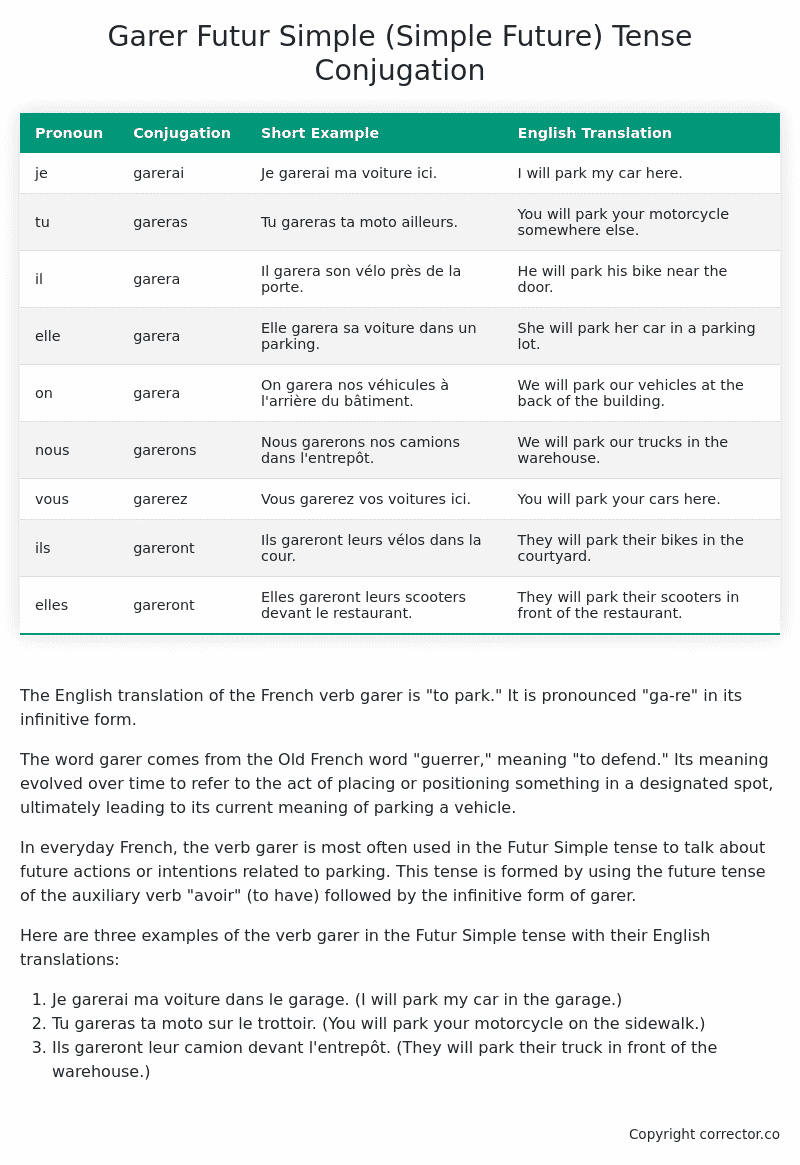Futur Simple (Simple Future) Tense Conjugation of the French Verb garer
Introduction to the verb garer
The English translation of the French verb garer is “to park.” It is pronounced “ga-re” in its infinitive form.
The word garer comes from the Old French word “guerrer,” meaning “to defend.” Its meaning evolved over time to refer to the act of placing or positioning something in a designated spot, ultimately leading to its current meaning of parking a vehicle.
In everyday French, the verb garer is most often used in the Futur Simple tense to talk about future actions or intentions related to parking. This tense is formed by using the future tense of the auxiliary verb “avoir” (to have) followed by the infinitive form of garer.
Here are three examples of the verb garer in the Futur Simple tense with their English translations:
- Je garerai ma voiture dans le garage. (I will park my car in the garage.)
- Tu gareras ta moto sur le trottoir. (You will park your motorcycle on the sidewalk.)
- Ils gareront leur camion devant l’entrepôt. (They will park their truck in front of the warehouse.)
Table of the Futur Simple (Simple Future) Tense Conjugation of garer
| Pronoun | Conjugation | Short Example | English Translation |
|---|---|---|---|
| je | garerai | Je garerai ma voiture ici. | I will park my car here. |
| tu | gareras | Tu gareras ta moto ailleurs. | You will park your motorcycle somewhere else. |
| il | garera | Il garera son vélo près de la porte. | He will park his bike near the door. |
| elle | garera | Elle garera sa voiture dans un parking. | She will park her car in a parking lot. |
| on | garera | On garera nos véhicules à l’arrière du bâtiment. | We will park our vehicles at the back of the building. |
| nous | garerons | Nous garerons nos camions dans l’entrepôt. | We will park our trucks in the warehouse. |
| vous | garerez | Vous garerez vos voitures ici. | You will park your cars here. |
| ils | gareront | Ils gareront leurs vélos dans la cour. | They will park their bikes in the courtyard. |
| elles | gareront | Elles gareront leurs scooters devant le restaurant. | They will park their scooters in front of the restaurant. |
Other Conjugations for Garer.
Le Present (Present Tense) Conjugation of the French Verb garer
Imparfait (Imperfect) Tense Conjugation of the French Verb garer
Passé Simple (Simple Past) Tense Conjugation of the French Verb garer
Passé Composé (Present Perfect) Tense Conjugation of the French Verb garer
Futur Simple (Simple Future) Tense Conjugation of the French Verb garer (this article)
Futur Proche (Near Future) Tense Conjugation of the French Verb garer
Plus-que-parfait (Pluperfect) Tense Conjugation of the French Verb garer
Passé Antérieur (Past Anterior) Tense Conjugation of the French Verb garer
Futur Antérieur (Future Anterior) Tense Conjugation of the French Verb garer
Subjonctif Présent (Subjunctive Present) Tense Conjugation of the French Verb garer
Subjonctif Passé (Subjunctive Past) Tense Conjugation of the French Verb garer
Subjonctif Imparfait (Subjunctive Imperfect) Tense Conjugation of the French Verb garer
Subjonctif Plus-que-parfait (Subjunctive Pluperfect) Tense Conjugation of the French Verb garer
Conditionnel Présent (Conditional Present) Tense Conjugation of the French Verb garer
Conditionnel Passé (Conditional Past) Tense Conjugation of the French Verb garer
L’impératif Présent (Imperative Present) Tense Conjugation of the French Verb garer
L’infinitif Présent (Infinitive Present) Tense Conjugation of the French Verb garer
Struggling with French verbs or the language in general? Why not use our free French Grammar Checker – no registration required!
Get a FREE Download Study Sheet of this Conjugation 🔥
Simply right click the image below, click “save image” and get your free reference for the garer Futur Simple tense conjugation!

Garer – About the French Futur Simple (Simple Future) Tense
Formation of Futur Simple
For regular -er verbs (e.g., parler – to speak)
For regular -ir verbs (e.g., finir – to finish)
For regular -re verbs (e.g., vendre – to sell)
Common Everyday Usage Patterns
Conditional Statements
Interactions with Other Tenses
Futur Antérieur
Conditional
Present
Summary
I hope you enjoyed this article on the verb garer. Still in a learning mood? Check out another TOTALLY random French verb conjugation!


